
- Vested Interest
Roomies With God

As the Trinity Choir prepares for our upcoming tour to England, we’ve begun the process of learning the music for the trip backwards and forwards. One piece in particular stands out to me: Herbert Howell’s One Thing Have I Desired.
It stands out in part because it’s really, really, preposterously hard. I mean, I’m not the greatest sight reader, but even some of our staff singers had a little trouble with it. But as with most very difficult music, now that I know it, it’s embedded itself in my brain, and I find myself humming it constantly.
This is great, because the words are very close to my heart. Howells took Psalm 27:4-7 for his text:
One thing have I desired of the Lord,
which I will require:Even that I may dwell in the house of the Lord all the days of my life,
To behold the fair beauty of the Lord,
and to visit his temple.For in the time of trouble he shall hide me in his tabernacle.
Yea, in the secret place of his dwelling shall he hide me,
And set me up upon a rock of stone.And now shall he lift up mine head above my enemies round about me.
Therefore will I offer in his dwelling an oblation with great gladness!
I will sing, and speak praises unto the Lord!
The singer desires—demands, even—to be allowed to dwell in the Jerusalem temple. I couldn’t resist checking the Hebrew, and the verb translated “dwell” is shabat, to cease or rest—the same root we get “Sabbath” from. So the singer is asking to rest from the labour of his life. The word here translated “visit” seems to mean something closer to “contemplate, reflect on.” What’s imagined here is a deep intimacy with God. When the singer is threatened, he imagines God hiding him in the inner rooms of his house—God’s bedroom, even. (This closeness is especially present in this translation, which emphasizes the flavor of secrecy and hiding over that of protection. I might even say that God is imagined more as a spouse than a parent.)
The larger biblical context heightens the intimacy being imagined. In the Hebrew Bible, God’s presence is real and really dangerous. In 2 Samuel 6:6-7, Uzzah is struck dead simply for touching the Ark of the Covenant to steady it while it’s being moved. The fact that he didn’t mean any harm doesn’t matter—God’s private room is simply too dangerous to touch. The purification laws for priests and worshippers laid out in Leviticus can be understood as a system for protecting the people of Israel against the dangers of encountering the divine—a bit like a set of safety regulations for workers in a nuclear power plant. God is glorious and powerful, and that glory and power is not safe.
And yet the singer of this Psalm wants to be roommates with God, so to speak. His perfect trust takes my breath away. God’s power and danger become a strong rock of support.
I think of this poem often during hard times. It seems natural to me to seek out holy places then, and to ask for the protection of a church sanctuary. And I’ll be thinking of these words in August, when we sing them in other magnificent temples of the Lord. May we all find God to be as close to us as those whose homes we share.
Listen to the Trinity Choirs sing One Thing Have I Desired on Spotify. Where do you find intimacy with God?
At "Vested Interest," church nerd Mary Davenport Davis explores all things liturgy and music at Trinity and beyond. Chime in with comments and questions!


Comments